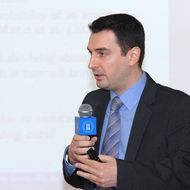- A
- A
- A
- ABC
- ABC
- ABC
- А
- А
- А
- А
- А
- HSE University
- Faculty of Economic Sciences
- Department of Theoretical Economics
- News
- Paper of Eren Arbatli in European Economic Review
-
Department
109028, Moscow,
Pokrovsky Boulevard 11, Rooms: S1029, S1030
Phone: +7 (495) 772-95-90*27172, 27174, 27601, 28270
The Department of Theoretical Economics brings together highly qualified specialists in various fields of economics, including micro and macroeconomics, monetary and financial theory, economic history and the history of economic thought. Our mission is to teach economic disciplines at HSE on the level of leading Western universities.
Karpov A. V., Markström K., Riis S. et al.
Discrete Applied Mathematics. 2025. Vol. 370. P. 57-70.
In bk.: Human-Centric Decision and Negotiation Support for Societal Transitions: 24th International Conference on Group Decision and Negotiation, GDN 2024, Porto, Portugal, June 3–5, 2024, Proceedings. Cham: Springer, 2024. P. 102-113.
Andreyanov P., Krasikov I., Suzdaltsev A.
arxiv.org. Theoretical Economics. Cornell University, 2024
109028, Moscow,
Pokrovsky Boulevard 11, Rooms: S1029, S1030
Phone: +7 (495) 772-95-90*27172, 27174, 27601, 28270

Paper of Eren Arbatli in European Economic Review

Congratulations to Eren Arbatli, Associate Professor of the Department of Theoretical Economics, on the publication of his paper "Sectarian aid, sanctions and subnational development" in the European Economic Review.
Below is a short summary of the paper.
Hezbollah, a Shia Islamist political party and militant group based in Lebanon, is believed to receive a significant amount of informal funding from Iran. In this paper we evaluate whether this funding has had any economically meaningful effect on subnational development in Lebanon. Since the amount of funding is not observed, we use Iranian oil rents and the intensity of sanctions against Iran as plausibly exogenous drivers of transfers to Hezbollah. Then, we leverage the well-established sectarian bias in Hezbollah’s spending to obtain conservative estimates of the direct effect of funding to Hezbollah. Studying the 1993-2010 period, we find a positive and economically significant relationship between Iranian oil windfalls and nighttime lights. This effect is significantly stronger in areas with greater concentration of Shia population. Also, nighttime lights are relatively lower in Shia areas than elsewhere during periods when sanctions against Iran intensified. These novel results attest to the non-negligible developmental effects of informal aid as well as how economic sanctions against donors might offset such effects.
Cemal Eren Arbatli
Associate Professor, Department of Theoretical Economics
- About
- About
- Key Figures & Facts
- Sustainability at HSE University
- Faculties & Departments
- International Partnerships
- Faculty & Staff
- HSE Buildings
- Public Enquiries
- Studies
- Admissions
- Programme Catalogue
- Undergraduate
- Graduate
- Exchange Programmes
- Summer Schools
- Semester in Moscow
- Business Internship
-
https://elearning.hse.ru/en/mooc/
Massive Open Online Courses
-
https://www.hse.ru/en/visual/
HSE Site for the Visually Impaired
-
http://5top100.com/
Russian Academic Excellence Project 5-100
- © HSE University 1993–2025 Contacts Copyright Privacy Policy Site Map
- Edit






